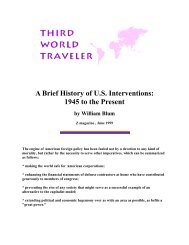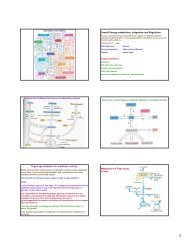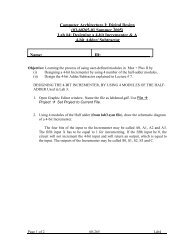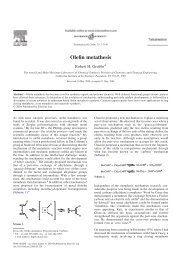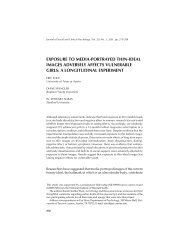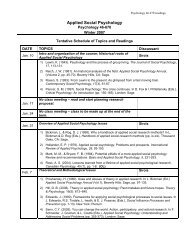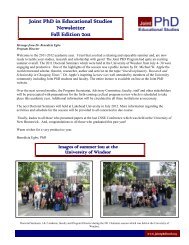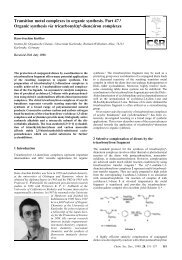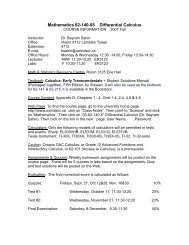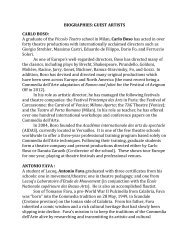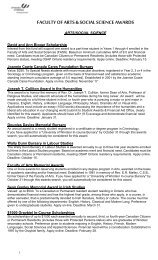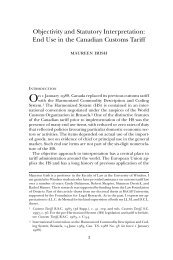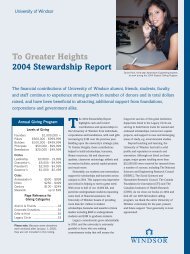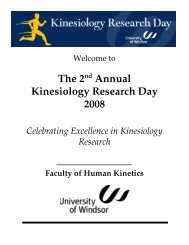Critical Social Work - University of Windsor
Critical Social Work - University of Windsor
Critical Social Work - University of Windsor
You also want an ePaper? Increase the reach of your titles
YUMPU automatically turns print PDFs into web optimized ePapers that Google loves.
Brown<br />
Within such standpoint approaches experience is <strong>of</strong>ten authorized in the process <strong>of</strong><br />
centering marginalized knowledge (see debate, Harding, 1997, Hartsock, 1997, Heckman, 1997a,<br />
1997b; Hill Collins, 1997, Longino, 1993; Smith, 1997). Experience is then understood to have<br />
an identity which is problematically conflated with Aessence, and that identity is seen to<br />
determine one’s politics. Every identity is presumed to have a standpoint and every standpoint<br />
an identity. Alongside the focus on identity politics, the tensions and contradictions which exist<br />
in modernist standpoint approaches to anti-oppression discourse include the problems <strong>of</strong><br />
essentializing and universalizing experiences (Brown, 2007a, 2011).<br />
Feminist postmodernist theorists critiqued feminist standpoint theory for its essentialism<br />
and universalizing <strong>of</strong> women’s voice and experience (Alc<strong>of</strong>f, 1988; Scott, 1988) and for the<br />
reified category <strong>of</strong> women itself (Butler, 1992; O’Riley, 1988, 1992). This occurred almost<br />
simultaneously with the feminist emphasis on addressing race, and then subsequently race, class<br />
and gender (Lorde, 1984; hooks, 1995). After unpacking the meaning <strong>of</strong> the category <strong>of</strong> women<br />
other social categories came under similar scrutiny. Influenced by Foucault (1980a, 1980b), as<br />
well as postmodernism in general, some feminist theory became more conceptually reflexive<br />
about the essentialism, universalism, and totalizing within social categories, such as gender, race,<br />
and class, its approach to power and knowledge, and <strong>of</strong> oppositional constructions such as<br />
powerful/powerless, oppressor/oppressed, emotion/reason, body/mind, subjectivity/objectivity<br />
etc. (Hill Collins, 2004; Spelman, 2004).<br />
These critiques <strong>of</strong>fer valuable insights for anti-oppressive theory in social work as<br />
uncovering, encouraging, and validating the suppressed voice <strong>of</strong> the oppressed is <strong>of</strong>ten a key<br />
assumption <strong>of</strong> anti-oppressive practice. Such uncovering is thought to reveal the non-oppressed<br />
or “true self”. This view suggests that the “authentic self”, is freed or liberated from dominant<br />
and oppressive structures and narratives through expression <strong>of</strong> the suppressed first voice (Brown,<br />
2007a, 2011). The naturalized self implies the existence <strong>of</strong> a real discoverable self (White, 2001,<br />
2007). Narrative practice in social work recognizes that underlying this belief is the idea that if<br />
we expose and challenge oppressive conditions which have had an impact on which people have<br />
become in the world the real or authentic self will be uncovered. Naturalistic accounts <strong>of</strong> the<br />
subject, are conceptualized as though there were a pure, untouched, or unscathed selfindependent<br />
<strong>of</strong> the social (Smith, 1999). The focus needs to remain on the conditions and<br />
construction <strong>of</strong> identity and self. A postmodernism lens suggests that there can never be a selfoutside<br />
<strong>of</strong> its social construction (Brown, 2007a; Foucault, 1980a; Smith, 1999).<br />
Ironically, the new story <strong>of</strong> the oppressed self-risks being separated from power, from its<br />
social construction in this humanist and modernist interpretation (White, 2001). While we have<br />
learned from Foucault (1980a, 1980b), we cannot escape power - it is everywhere - the fiction <strong>of</strong><br />
the idealized first voice is that it has managed to escape social construction, escape power. It<br />
must then exist as inherently real, true, or essential. Privileging, idealizing, and naturalizing the<br />
first voice, or first voice experience, takes it up as it is pre-constituted. The subsequent<br />
privileging or authorizing or experience as truth as uncontestable means it does not need to be<br />
unpacked - it can be left as it is.<br />
According to Hick (2005) experiences must be situated within the social contexts in<br />
which they have emerged:<br />
<strong>Critical</strong> <strong>Social</strong> <strong>Work</strong>, 2012 Vol. 13, No. 1<br />
41



